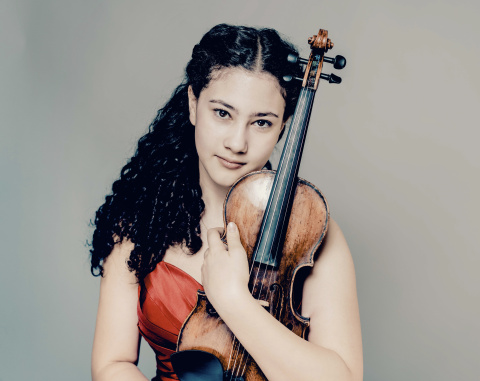MARIAM ABOUZAHRA
MARIAM ABOUZAHRA
17-year-old violinist Mariam Abouzahra was born in Germany to Hungarian-Egyptian parents. She made her orchestral debut at the age of six and has since performed as a soloist with the Moscow Philharmonic, Royal Philharmonic Orchestra London, ORF Radio Symphony Orchestra Vienna, Concerto Budapest, Milano Symphony Orchestra, Geneva Chamber Orchestra, and many others. She has played in 25 countries, in venues such as the Vienna Musikverein, Lincoln Center New York, Covent Garden London, Tchaikovsky Hall Moscow, and Teatro Carlo Felice Genoa. In 2024, she was invited to the Verbier Festival as a “Junior String Soloist.” Since 2019, she is studying with Dora Schwarzberg in Vienna. Mariam has taken part in masterclasses with musicians as G. Schulz, C. Tetzlaff, G. Pauk, and A. Hadelich. She has won numerous prizes, including 1st Prize at the Viotti Competition, and has performed with artists such as Plácido Domingo, Gábor Takács-Nagy, Maxim Rysanov, Dmitry Sitkovetsky, István Várdai, and András Keller.
1. Was there a specific moment or experience that made you realize you wanted to become a musician?
1. Both of my parents are pianists, so becoming a musician felt like the most natural path for me. I grew up watching them go on concert tours around the world with various orchestras. Since I can remember, I’ve been surrounded by a life of listening, practicing, traveling and performing.
2. When you perform,what do you hope to communicate or make the audience feel?
2. In every piece of music, there are thoughts and emotions, a message that the composer sends us - something that often cannot be put into words but through music, we are able to feel. When I perform, I see it as my responsibility to convey this emotional message to the audience, whether the composer lived 300 years ago or is still alive today.
3. If you had to present yourself by playing a single piece from the entire repertoire,which one would you choose,and why?
3. If I had to present myself with a single piece, I would choose Bartók’s Solo Sonata. Being half Hungarian, I grew up surrounded by Hungarian folk songs, and although the sonata doesn’t directly quote them, it speaks in their language. As Bartók’s said, he drew inspiration from folk music - from the pure source - and at the same time, the sonata expresses the most sincere and profound human emotions with the depth and structural integrity of Bach’s solo works


